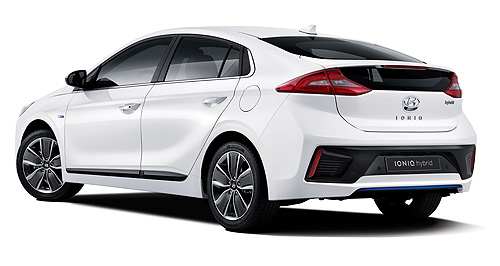Make / Model Search
Future models - Hyundai - IONIQMore details for Hyundai IoniqExclusive admission: After a pair of renderings, Hyundai has finally offered a true look at the interior of its new Ioniq. Hyundai reveals first tech-specs for forthcoming IoniqGallery Click to see larger images 7 Jan 2016 HYUNDAI's almost daily trickle of information previewing the forthcoming all-new Ioniq hatch continues, this time with the first real images and some concrete figures. Despite the latest titbit of information, the South Korean car-maker is still yet to reveal a photograph of the car's front end with only previous renderings and sketches to go on, but Hyundai has released some technical details of the model's three electrified powertrains. With the release of the images, it is now clear that the car is a hatch, not a sedan as previously expected. While a pure electric variant will be offered, only the hybrid versions are covered in the fourth release regarding the new range, which will be available as a petrol electric hybrid or plug-in equivalent. Under its bonnet is a 1.6-litre GDi petrol engine which produces 77kW and 147Nm, but thanks to its ultra-efficient Atkinson cycle manages a thermal efficiency of 40 per cent – the world's most efficient according to Hyundai. The engine was specially developed for hybrid applications and has specialist design features such as a 1:35 stroke-bore ratio and a separated cooling for the cylinder head and block. Its power is combined with a 32kW/167Nm permanent magnet electric motor which draws power from lithium-ion battery for a combined output of 109kW and 314Nm. Power is sent to the front wheels via a six-speed dual clutch automatic transmission, which has been “optimized” for its hybrid application, resulting in a transmission efficiency of 95.7 per cent. More details have also emerged regarding the Ioniq's structure, such as its part-aluminium construction which comprises the bonnet, bootlid, front cross member as well as some front and rear suspension components. Where heavier steel had to be used, higher-strength grades were used to maintain stiffness and impact protection without adding unnecessary weight. Locating the EV drivetrain battery low down in the chassis has resulted in a lower centre of gravity for improved handling and road-holding in corners. Hyundai has not yet revealed performance figures such as acceleration and fuel economy, or any details regarding the third electric-only variant, but more information is almost certainly on its way in the immediate future. The model will make its public debut at the Geneva motor show in March, following its first reveal in South Korea later this month and is expected to arrive on Australian soil in the second half of the year. Only the hybrid version will be offered locally but Hyundai Australia is still weighing up the possibility of the plug-in variant as well.  Read more6th of January 2016  Geneva show: More Hyundai Ioniq images emergeHyundai releases fresh interior and exterior renderings of forthcoming IoniqAll future models Alfa Romeo Alfa Romeo Abarth Abarth Alpine Alpine Alpina Alpina Audi Audi Aston Martin Aston Martin BMW BMW Bentley Bentley Chery Chery Brabham Brabham Chrysler Chrysler Chevrolet Chevrolet Cupra Cupra Citroen Citroen DS DS Dodge Dodge Fiat Fiat Ferrari Ferrari Foton Foton Ford Ford Great Wall Great Wall FPV FPV Haval Haval GWM GWM Honda Honda Holden Holden Hummer Hummer HSV HSV Infiniti Infiniti Hyundai Hyundai Jaguar Jaguar Isuzu Isuzu Kia Kia Jeep Jeep Land Rover Land Rover Lamborghini Lamborghini Lexus Lexus LDV LDV Mahindra Mahindra Lotus Lotus Mazda Mazda Maserati Maserati Mercedes-AMG Mercedes-AMG McLaren McLaren MG MG Mercedes-Benz Mercedes-Benz Mitsubishi Mitsubishi Mini Mini Opel Opel Nissan Nissan Peugeot Peugeot Pagani Pagani Proton Proton Porsche Porsche Renault Renault Ram Ram Rover Rover Rolls-Royce Rolls-Royce Skoda Skoda Saab Saab SsangYong SsangYong Smart Smart Suzuki Suzuki Subaru Subaru Toyota Toyota Tesla Tesla Volvo VolvoMotor industry news |
Click to shareHyundai modelsResearch Hyundai All future models Alfa Romeo Alfa Romeo Abarth Abarth Alpine Alpine Alpina Alpina Audi Audi Aston Martin Aston Martin BMW BMW Bentley Bentley Chery Chery Brabham Brabham Chrysler Chrysler Chevrolet Chevrolet Cupra Cupra Citroen Citroen DS DS Dodge Dodge Fiat Fiat Ferrari Ferrari Foton Foton Ford Ford Great Wall Great Wall FPV FPV Haval Haval GWM GWM Honda Honda Holden Holden Hummer Hummer HSV HSV Infiniti Infiniti Hyundai Hyundai Jaguar Jaguar Isuzu Isuzu Kia Kia Jeep Jeep Land Rover Land Rover Lamborghini Lamborghini Lexus Lexus LDV LDV Mahindra Mahindra Lotus Lotus Mazda Mazda Maserati Maserati Mercedes-AMG Mercedes-AMG McLaren McLaren MG MG Mercedes-Benz Mercedes-Benz Mitsubishi Mitsubishi Mini Mini Opel Opel Nissan Nissan Peugeot Peugeot Pagani Pagani Proton Proton Porsche Porsche Renault Renault Ram Ram Rover Rover Rolls-Royce Rolls-Royce Skoda Skoda Saab Saab SsangYong SsangYong Smart Smart Suzuki Suzuki Subaru Subaru Toyota Toyota Tesla Tesla Volvo VolvoMotor industry news |















Facebook Twitter Instagram